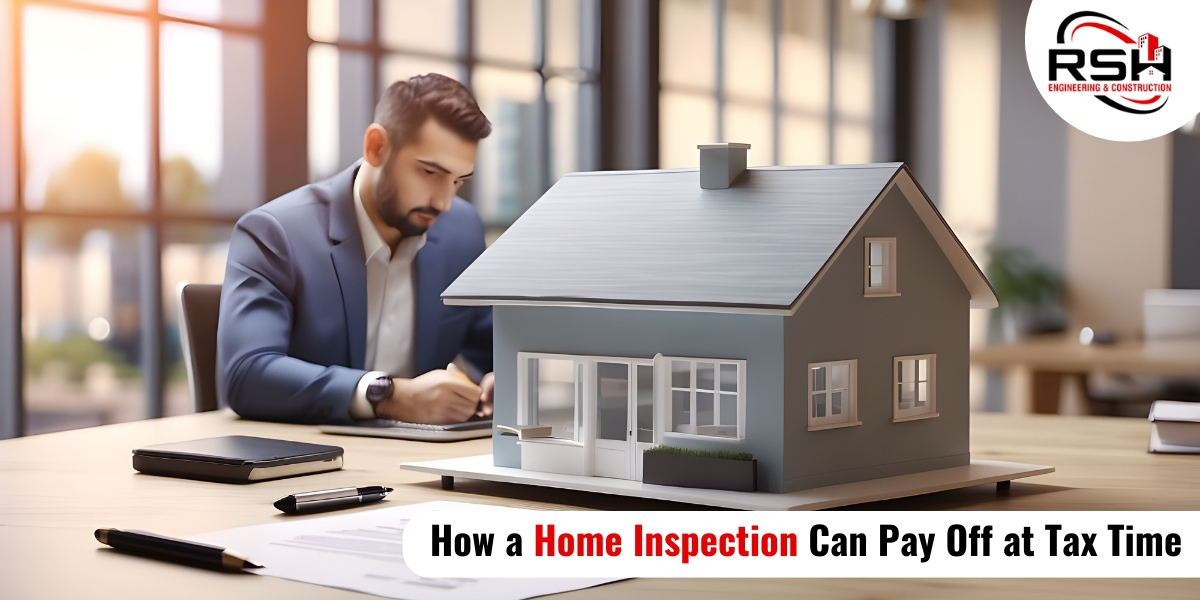Buying a home or maintaining one is no small feat. It requires significant investments, both financial and emotional. Yet, one often overlooked aspect of homeownership is how a home inspection can pay off at tax time. While home inspections are typically associated with ensuring your property is well-maintained, they can also offer several tax benefits.
Understanding these home inspection tax benefits can lead to significant savings during tax season. Here we will get how a home inspection pay off at tax time, how to maximize deductions, and why hiring local home inspections or home foundation inspectors can be a smart financial move.
The Tax Benefits of Home Inspections
When you hire a home inspector, you’re primarily looking for:
- Any signs of damage, deterioration, or potential issues like the signs of foundation problems.
- Protects you from unforeseen repair costs down the line.
- There are also some critical home inspection tax deductions you can claim.
For instance, if you own a rental property or use part of your home for business, certain inspection-related costs may be deductible. If a home inspection uncovers issues that require repairs or improvements, and these improvements are related to a rental or business property, the costs could be deductible in the tax year the repairs are made.
The home inspection pay off at tax time can also lead to commercial property owners who hire a commercial inspector to assess their buildings, who may be eligible for deductions tied to maintenance and improvement costs.
Key Tax Deductions from Home Inspections
Are you aware of the tax deductions from home inspections? No, here is the list:
1. Rental Property Deductions:
- If you own rental property, any home inspections conducted to ensure tenant safety or property condition could be tax-deductible.
- Maintaining rental properties, including inspections, often qualify as business expenses.
2. Home Office Deductions:
- A home inspection may reveal necessary repairs for homeowners who use part of their property as a home office.
- Any repairs directly related to your home office could qualify as a tax deduction.
- For example, the repair costs could be deducted if the inspection uncovers foundation problems that affect your home office.
3. 11th Month Warranty Inspection:
- New homeowners with a one-year builder warranty can benefit from an 11-month warranty inspection.
- The inspection helps you catch any issues before the warranty expires.
- While this inspection may not directly provide a tax deduction, addressing potential problems before your warranty runs out saves you money in the long run, which could be seen as indirect financial gain.
Home Inspection Costs: Can They Be Deducted?
While most homeowners may not deduct the home inspection cost during a property purchase, sure homeowners, such as rental property investors or those with home offices, might be eligible. Keeping track of all inspection-related costs, whether hiring a home foundation inspector or a commercial inspector, will help maximize your potential deductions when tax season arrives.
Moreover, suppose the home inspection pay off at tax time reveals necessary improvements (like repairing electrical or foundation problems). In that case, you might be able to deduct these improvements, especially if they’re tied to rental or business-related use of the property.
Home Inspection and Building Permits
When the home inspector flags issues that require significant repairs or improvements, such as foundation problems or roof replacements, you will likely need to apply for building permits before undertaking any work.
The cost of these permits, while not deductible on their own, can often be factored into the overall expenses that may qualify for tax deductions if they are tied to rental or commercial properties.
In essence, the costs you incur from obtaining building permits can be added to your repair or improvement expenses, leading to potential tax savings.
Foundation Problems: The Hidden Tax Benefit
One of the most costly issues a home inspector may uncover is foundation problems. If you own a rental property or have a home office and the inspector identifies a foundation issue, repairing it could lead to significant tax savings from home inspection. This is because foundation repairs are often classified as necessary maintenance or improvement for business or rental properties, making them deductible.
It’s crucial to keep accurate records of these repairs, including invoices and receipts, to claim them as tax deductions.
Commercial Property Inspections and Tax Deductions
For commercial property owners, hiring a commercial inspector is a crucial step in:
- Ensuring your property remains safe and up to code.
- Regular inspections help you avoid costly repairs and potential legal liabilities, but they also offer tax advantages.
- Any improvements made due to an inspection can be deducted as business expenses.
Moreover, maintaining your property’s foundation, plumbing, or electrical system helps you avoid future problems and allows you to take advantage of certain home inspector tax deductions for maintenance and repairs.
The Role of Local Home Inspectors
Hiring local home inspectors can provide more than mind stability when it comes to home inspections. Their familiarity with the area’s building codes, joint issues, and climate-related problems makes them more likely to catch potential issues that non-local inspectors may miss.
Who are Local Inspectors?
Local inspectors are also more likely to understand regional tax laws and regulations that could impact your home inspection tax benefits. Whether you’re dealing with the following properties, residential or commercial, having a knowledgeable local inspector can help you maximize your tax deductions from home inspection.
How Home Inspections Pay Off at Tax Time?
While the primary reason for hiring a home inspector may be to ensure the safety and longevity of your property, the financial benefits can extend far beyond immediate repairs. By identifying issues like foundation problems or other maintenance needs early on, homeowners can prevent costly repairs and reap the benefits of various tax deductions.
Whether you’re a commercial property owner, a landlord, or a homeowner with a home office, keeping detailed records of your inspection-related costs, repairs, and improvements is crucial. From applying for building permits to addressing foundation problems, every step you take after a home inspection could contribute to tax savings home inspection, RSH Engineering Service, guide every time.
Final Thoughts
Don’t neglect the impact a thorough home inspection pay off at tax time can have on the safety and longevity of your property and your financial well-being. From identifying critical repairs to unlocking valuable tax deductions, home inspections pay off at tax time property investors might not expect.





